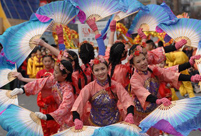 Turnip sculptures amaze tourists in Qingdao
Turnip sculptures amaze tourists in Qingdao Chinese ship formation conducts live fire training in West Pacific
Chinese ship formation conducts live fire training in West Pacific
 China comes in third at figure skating team event
China comes in third at figure skating team event
 China's teenager skater Yan shines at his Olympic debut
China's teenager skater Yan shines at his Olympic debut
 Taiwan-born actor stars on US TV series
Taiwan-born actor stars on US TV series
 Chinese Lunar New Year gift from abroad
Chinese Lunar New Year gift from abroad Chinese champions of Winter Olympic Games
Chinese champions of Winter Olympic Games  Zhang Yimou fined 7.48 mln for over-production
Zhang Yimou fined 7.48 mln for over-production
 Top 10 timeless female Chinese stars
Top 10 timeless female Chinese stars
SEOUL, Feb. 12 -- Former Japanese Prime Minister Tomiichi Murayama, known for his apology for past wartime atrocities while in office, said Wednesday that Shinzo Abe, incumbent prime minister, has no choice but to honor the Murayama Statement.
"All previous prime ministers of Japan said that they inherit the Murayama Statement. Abe also stated once that he inherits the statement. I believe there has been no falsehood in that pledge," Murayama said during his lecture to South Korean lawmakers at the parliamentary headquarters.
Murayama came here Tuesday for a three-day visit to Seoul at the invitation of South Korea's minor opposition Justice Party. Murayama made an official apology via the famous "Murayama Statement" in 1995, when he was in office, for Japan's past atrocities and war of aggression during its colonial rule of Asian nations.
Murayama said he was assured of Abe's succession of its past apology because he cannot deny Japan's invasion in the past, noting that anyone who denies the Murayama Statement should resign from his Cabinet post.
Touching on Abe's push for collective self-defense right, Murayama said that Japan declared its abandonment of waging a war through the pacifist Constitution, which prevented the Japanese self-defense forces from falling into a war.
The 91-year-old stressed that the constitution must be protected in any event, saying that there were many Japanese people who share such thought with him.
He added that it will contribute to national interests of Japan, while benefiting South Korea and China, and peace and prosperity in the region.
Right after arriving here on Tuesday, Murayama-old visited the parliamentary headquarters where an exhibition of artworks by former South Korean "comfort women" is being held.
At the exhibition, the former Japanese prime minister met three South Korean women who were coerced into sex slaves at the Japanese military brothel during the World War II, when more than 200,000 young women, many of them South Koreans, were forced into sex slavery.
He became the first among incumbent and former Japanese prime ministers who meet with the victims of the sex slavery.
"When I met the comfort women of old age and saw the pictures drawn by them, I became speechless. I hung my head down, and could not raise it up," said Murayama. "(Japan) did the indescribable wrongdoings, which robs women of their dignity."
Murayama said that some people in Japan made many absurd remarks about the comfort women issue, which he felt ashamed of, noting that a majority of Japanese were well aware of Japan's wrongdoings. He added that he hopes the South Korean people can understand it.
Japan must squarely face up to its history and apologize for it, Murayama said, noting that Seoul and Tokyo must establish future- oriented relationship based on Japan's repent over its past brutalities.
Ties between South Korea and Japan have been strained since Japanese Prime Minister Shinzo Abe took office in late 2012. In December last year, Abe visited the controversial Yasukuni Shrine, a symbol of Japan's militaristic past as it enshrines 14 World War II class-A war criminals.
The ongoing historical and territorial disputes between the two countries stemmed from Japan's colonial rule of South Korea from 1910 to 1945. Those include the comfort women as well as the territorial dispute over the islets off South Korea's east coast known as Dokdo here and Takeshima in Japan.
 Highlights of opening ceremony of Sochi 2014 Winter Olympic Games
Highlights of opening ceremony of Sochi 2014 Winter Olympic Games Highlights of Chinese New Year celebrations around the world
Highlights of Chinese New Year celebrations around the world  Chinese ship formation conducts live fire training in West Pacific
Chinese ship formation conducts live fire training in West Pacific Sanya bans skinny dipping in public beach
Sanya bans skinny dipping in public beach Top 20 most beautiful Chinese stars
Top 20 most beautiful Chinese stars  PLA navy conducts landing drills in South China Sea
PLA navy conducts landing drills in South China Sea  Snowscape in Chinese New Year
Snowscape in Chinese New Year Top 10 timeless female Chinese stars
Top 10 timeless female Chinese stars Top 10 Chinese films in 2013
Top 10 Chinese films in 2013 New Year greetings from Chinese nationals in Africa
New Year greetings from Chinese nationals in Africa Miss Chinese Int'l Pageant 2014 held in Hong Kong
Miss Chinese Int'l Pageant 2014 held in Hong Kong Severe coldness freezes large parts of China
Severe coldness freezes large parts of China  Beautiful moments of Sochi
Beautiful moments of Sochi  Interesting horse figures in life
Interesting horse figures in life  Selfies of "Little colorful flag" girl unveiled
Selfies of "Little colorful flag" girl unveiled Day|Week|Month